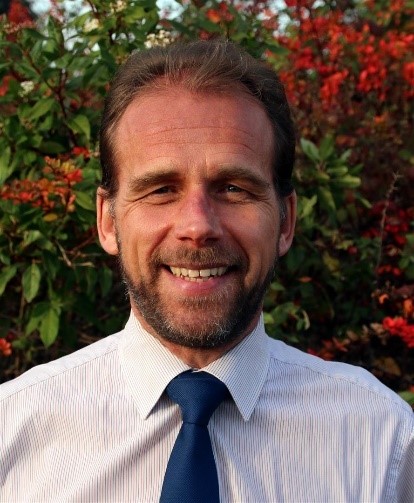
Full Name: Neil Parry
Job Title: Technical Director
Company: Geotechnical Engineering Limited
I’m a chartered Civil Engineer and SiLC with 32 years’ experience working for major contractors and consultants on many different projects including major infrastructure, military, demolition and remediation schemes, latterly in the ground investigation sector. I am a member of the AGS Loss Prevention Working Group, chaired the Contaminated Land Working Group between 2013 and 2017 and was chair of the AGS between 2017 and 2019. I am involved in the working groups revising the specification for ground investigation and developing an NEC type contract for GI work, I am also currently chair of Ground Forum.
What or who inspired you to join the geotechnical industry?
I began my career working as a site engineer with Alfred McAlpine and AE Farr Limited in the late 1980s on construction sites such as the Avon Ring Road and building munitions igloos for the US Airforce. I was based at the offices of Acer Freeman Fox in Bristol, gaining design experience for my Civils chartership when AE Farr went into receivership, a victim of the severe downturn in 1990. Despite being re-employed by Amey Construction I decided that it was best for my young family to leave civil engineering contracting and take up the offer of consultancy work with Acer. I originally worked in bridge design and on water projects, but due to my undergraduate specialism in soil mechanics ended up in the geotechnical engineering team. I enjoyed the mix of site-based and design work and quickly realised that this was what I wanted to do for the rest of my career. I was lucky to work with several knowledgeable and inspiring leaders who encouraged me to progress within the geotechnical industry. When I had the opportunity to study for an MSc in the relatively new subject of environmental geology/geoenvironmental engineering I jumped at the chance and undertook the course on a part-time basis over three years. I really enjoyed learning a new subject and was encouraged by the people I worked with to continue in this sector. I continue to work on both geotechnical and geoenvironmental work.
What does a typical day entail?
As most people will say there are rarely typical days in ground investigation/geotechnical engineering. If we have a major project that is about to start or I am visiting a site for the first time there is often a health and safety induction or briefing. The importance of health, safety and wellbeing is perhaps the most significant advancement in the industry that I have seen in the last 30 years and I am pleased to have seen this progress.
It is likely that I will attend a meeting, either internally, on AGS business or with one of our clients. Despite technical advancements allowing remote interaction I feel that the importance of face to face meetings cannot be overestimated and I believe that personal contact is a significant aid to promoting collaborative working.
I may be involved in reviewing a contract or undertaking technical checks of test results, logs or reports, hopefully providing positive encouragement and advice. I may also be required to design the anchor system for one of our slope climbing rigs prior to it being deployed to a slope anywhere in the UK.
Are there any projects which you’re particularly proud to have been a part of?
I try to take pride in whatever project I’m involved in at the time, whether it is a £20,000 investigation for a housing project or on major GI works costing millions of pounds for a large infrastructure scheme. Some of the projects that come to mind however are working on the feasibility of scheme options for the A465 ‘Heads of the Valleys’ Road, which is currently under construction many years later. I also worked on the geotechnical design and supervised the GI for a £200 million indoor ski centre in Taiwan. I have been involved in several brownfield land schemes such as the gasworks remediation for the Thistle Centre in Scotland and the demolition/remediation works for Bede Island in Leicester. Recently Geotechnical Engineering have undertaken work on several large infrastructure projects, which have been challenging and rewarding.
What are the most challenging aspects of your role?
Like most people working in our industry I have several different roles and responsibilities, both within Geotechnical Engineering and the AGS. I am passionate about promoting the value of technical skills and it is disappointing when these are dismissed or marginalised reducing the benefit of the work we do. Working directly to the requirements of a specification may not produce the best technical value for the project and early contractor involvement greatly helps in improving specifications in respect to the proposed works.
I also find the it challenging to promote the fairness of relationships between parties when entering into contracts. I believe that those taking the risks under a contract should be rewarded for doing so and there is an important balance between assigning risk and responsibility between contractual parties.
What are the aims and objectives of the Ground Forum?
The Ground Forum provides a single point of contact for ground related industries (including the AGS, EGGS, BGA, FPS, BDA and several others) with government and official bodies, giving the geotechnical fraternity a voice within the construction industry. Ground Forum exists to:
• Provide an effective point of communication between Member Organisations.
• Enhance the profile of the ground engineering industry.
• Raise youth awareness of the satisfaction and rewards of a career in ground engineering.
• Promote good practice in all ground related disciplines.
• Enhance training through CPD.
• Promote the value of good ground engineering and geotechnics.
• Lobby the government and other construction organisations on issues of concern for the ground engineering sector.
As the Chair of Ground Forum, what does your role involve?
The chair of Ground Forum provides a coordinating role between the fifteen member organisations. There are three to four committee meetings every year plus attendance at events by the Construction Industry Council and Parliamentary and Scientific Committee. As there are a wide range of different views on the industry between the different bodies represented (for example the Institute of Materials, Minerals and Mining (IOM3) and the International Geosynthetics Society) it is important to forge a common purpose and develop agreed objectives.
What are the current focuses of the Ground Forum?
Currently Ground Forum is focussed upon:
• Lobbying the Government to ensure infrastructure spending is maintained through to addressing the status of valued European employees and maintaining UK access to skilled operatives and professionals.
• The Impact of Brexit on ground engineering sector.
• Addressing the shortage of Ground Engineering professionals.
• Maintaining Ground Engineers on the Government’s shortage of occupations list.
• Supporting university degrees and specialisms in ground engineering.
• Ensuring the industry maintains its access to expertise and well trained graduates.
Why do you feel the AGS are an integral member of the Ground Forum?
The AGS has quite a diverse membership, representing several different aspects of the ground engineering industry. This is reflected in the different AGS Working Groups, including the proposed Instrumentation and Monitoring group. This helps the AGS to understand the needs across the industry and several AGS members have successfully chaired Ground Forum.
Why do you feel the AGS and the Ground Forum are important to the industry?
There is a need to constantly promote the quality of our ground engineering professionals and the work they do in an industry that is literally “covered up”, so that our work is often unseen. Without bodies such as AGS, Ground Forum and their membership bodies I believe standards would be in danger of slipping with significant repercussions.
What changes would you like to see implemented in the geotechnical industry?
Although maintaining a high skill base is crucial and the possibility of skills shortages could have a major impact, I believe the promotion of health, safety and wellbeing is crucial to the success of the geotechnical industry. We need to look after our young engineers to allow them to develop both technically and in their quality of life.
The output from the recently established joint procurement of ground investigation working groups will hopefully lead to beneficial changes in what can often be the most important part at the start of a scheme. I’m hoping the results of these groups will be beneficial to all of the industry and adopted by client organisations throughout the UK.
